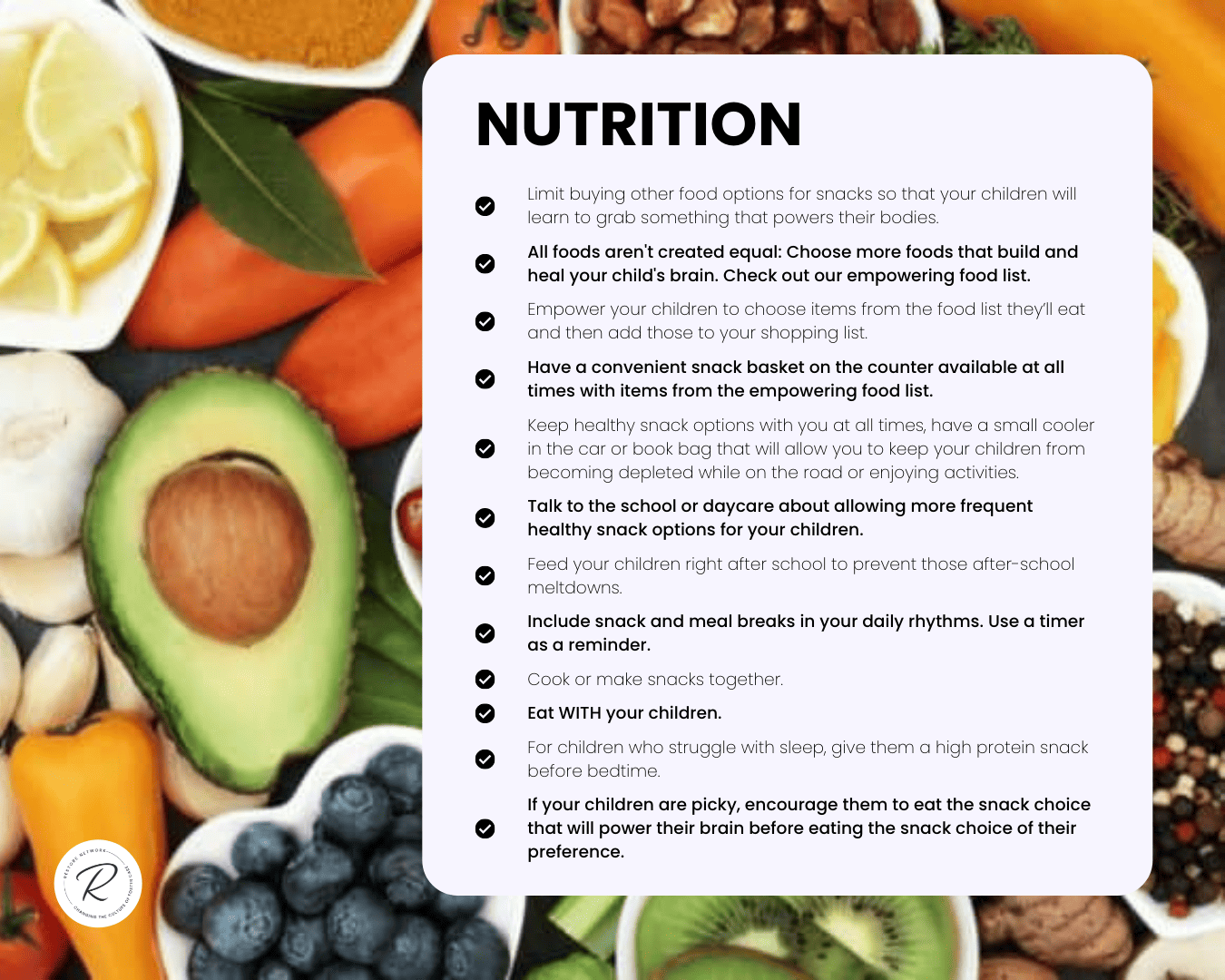by Ashley Bennett, Director of Trauma-Informed Care
Alright so the candy bar, Snickers, taught us this one. We aren’t ourselves when we don’t eat.
Have you ever been hangry before? I know I have! And my kids? Definitely. What you eat and how often you eat does affect moods and behaviors.
It is recommended that you look for food options for your children that involve healthy proteins and complex carbohydrates and that, just like with hydration, you feed your children (and you!) something every two hours. Eating these types of foods every couple of hours can lessen the dips and spikes in blood sugar which contributes to the moments we see BIG behaviors.
Eating foods rich in protein lead to higher levels of dopamine and norepinephrine, which are hormones that play a role in your mood, motivation and concentration. Examples of healthy proteins include fish, yogurt, beans, chicken, turkey, cottage cheese, low fat milk, eggs, almonds, lean beef, & tuna.
Complex carbohydrates are found in foods such as beans, whole grains, and vegetables. Carbohydrates contribute to the increase in the amount of serotonin in your brain, which has a calming effect.
If you think that maybe certain foods are affecting your child negatively, keep a food journal for two weeks and look for patterns. Document your child’s moods and behaviors and see if they correlate with a lack of eating or certain foods they are eating. You might find it helpful to eliminate certain foods after this process. Or you might just realize that it was hanger that was the major culprit behind some of your child’s challenging moments and simply changing your pattern of eating will make things so much better!
One Restore Network foster momma took this to heart when her toddler had screaming fits at certain times of the day. She began to track it and realized it was occurring right before mealtimes-that her kiddo was actually hungry but didn’t realize it! So, she moved up her mealtimes by 20 minutes, put together a healthy snack basket for the counter, and began teaching her child how to understand her own body and ask for a snack when she felt that way. Guess what happened after that? You guessed it, no more screaming fits!
Another Restore Network foster momma realized how badly sugar was affecting her child’s mood and increasing argumentative control battles between them. When she began to eliminate it, she saw a decrease in these incidents and a better overall mood for her child!
Physicians and other foster families have also told us that they have found omega-3 fatty acids and magnesium to be helpful supplements to include in their child’s diet but you can also get these things from eating certain foods.
Maybe the idea of feeding yourself, or your children, every 2 hours sounds exhausting, and you really don’t want to have to change up your eating habits. Maybe this isn’t how things were in your own home as a child and maybe this isn’t the way you raised your biological children so far. I get that!
But our kids didn’t get an optimal start to life and so their brains and bodies are going to possibly need different things than we needed. Our children might have missed out on getting some of the building blocks that their brain needed due to poor nutrition and no prenatal care in utero. Drugs, alcohol, and toxic stress might have been something they were introduced to instead and these things all effect the way the brain grows and wires itself. They also affect the way a person digests and absorbs food.
After birth, some of our children experienced malnourishment and didn’t’ have enough food to eat-something else that contributes to the brain not growing the way it was designed to. Out of a lack of understanding, some of our babies were given bottles of juice and soda, instead of formula or breast milk. And as our kids got older, they were likely given a lot of foods that didn’t contribute to the healthy growth of their brain.
But our children are with us now, and we can go back and give them what they missed. But just like we said with hydration, we can’t just tell our children to “get a healthy snack” or expect them to remember to eat something every couple of hours or know the needs of their own bodies. We can’t even do this with our teens, even though they have the independence skills to be able to do some of this on their own.
We are going to have to model and do this with them!
We know this can be a challenge, so see below for some tips and tricks along with our empowering food list to give you some ideas! Go through the list and circle what you know your family will eat and make sure those items are on the shopping list next time! As summer begins, I’ve printed this list out and it lives on my refrigerator so I can make sure to remember some good food ideas for my family! This list will be the basis for our summertime lunches and snacks.
Access the Empowering Food List.

